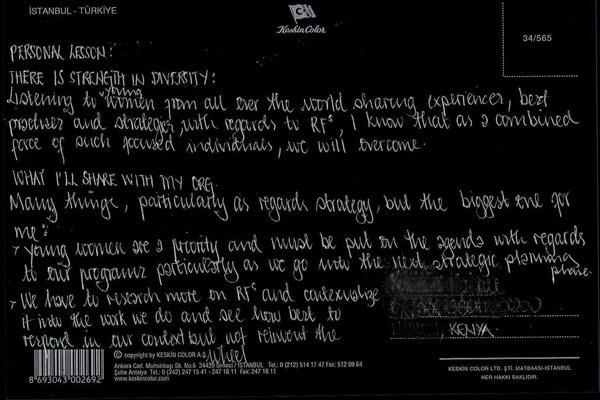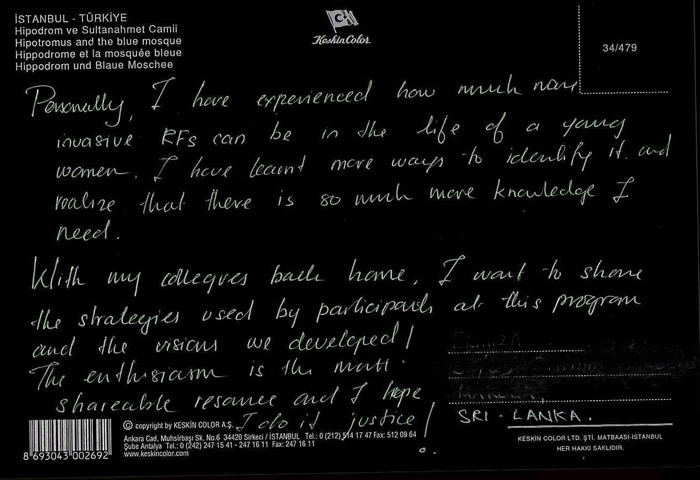Rewriting the Book
Young Women Challenge Religious Fundamentalisms
Some scholars say that religious fundamentalist movements are on the rise around the world. Others say that the movements are the same but they are just getting more media coverage in this post-September 11th world. Still others argue that fundamentalist movements ebb and flow, responding to changing economic and political conditions.
Regardless of the answer, two things are certain: Young women today are feeling the effects of fundamentalist movements differently than their mothers did--and they are uniquely positioned to challenge fundamentalisms' impact.

Young Women Share Stories
Five young women armed with colored magic markers have illustrated sixty years of their country's history with fundamentalism. Two strong trees marked "Ignorance" and "Marginalization" hold up an undulating timeline in their branches. Lightning bolts and raindrops fall down on the trees from clouds overhead, called "Repressive Government," "Foreign $" and "Terror."
Above the clouds sits a fat yellow sun, labeled "Human Rights." Rays of light shine out over the entire scene, each named in bold letters: "Feminism," "Equality," "Tolerance," "Diversity," "Freedom."
These impromptu artists joined over 25 other participants at the Young Women's Institute on Challenging Fundamentalism, sponsored by the AWID. Young women from 26 countries gathered in Istanbul, Turkey in November of 2007 to chart how fundamentalism affects their lives and to brainstorm visions for a world free of such controlling forces.
Religious Fundamentalism Defined
Conference organizer Sanushka Mudaliar, manager of AWID's Young Feminist Activism Program, explains: "A lot of young women are growing up in environments where, because of religious fundamentalisms, female sexuality is very differently controlled for them than it was for their mothers."
AWID defines "fundamentalism" as the use of religion, ethnicity, and culture to mobilize and gain political power in a society. While not all fundamentalist movements are necessarily bad or harmful, AWID is concerned about the role they play in prescribing how women live, from enforcing dress codes, dictating appropriate intimate relationships, and sanctioning movement and participation in public life.
First Person Accounts
Several participants agreed to be interviewed about how fundamentalism looks and feels in their daily lives, but asked to remain anonymous due to threats associated with their activism.
A young woman from Israel discussed challenges women face living in a Jewish State:
One of the main problems facing women in Israel today is that all matters of marriage and divorce are handled in religious Jewish courts. In these courts, women cannot testify as witnesses. Women cannot obtain a divorce on their own will, a divorce has to be granted willingly by the husband, and many husbands take advantages of this and won't grant a divorce without a woman giving up custody of her children or rights on shared property.
A Pakistani participant outlined how fundamentalist movements affect women living in an Islamic state:
The situation is very bad in the Northwest frontier province of Pakistan where these groups are threatening parents not to enroll their girls in school, and if a girl is going to school they are posing threats to the school administration as well. Girls cannot go to schools, now. If they go, there is a threat to their lives.
And they are also having fatwas, or declarations, against contraception, calling it illegal. They have attacked government health departments that are providing contraceptive facilities. Last year there was an instance where two workers from the Population Welfare Department were killed by these groups.
A young woman from the Republic of Georgia shared stories of lives affected by the Orthodox Christian Church.
Georgians are very religious and quite conservative in their religious beliefs. Young women are taught to obey their parents no matter what. A good example would be forced marriages, especially so-called "bride kidnapping" which is still widespread in Georgia, when a young girl is forced to get married after being kidnapped and raped. She cannot refuse, oftentimes, because of her parents.
A young Spanish woman working in Honduras discovered an invisible, yet powerful, fundamentalist control:
In Honduras, religious fundamentalisms are mostly Catholic and Evangelical. Those two fundamentalisms get together and carry out common actions, which makes it all the more difficult. As they are more powerful, there's no division between them.
Something that has always drawn my attention is the extent to which these fundamentalisms have permeated the society, that now it isn't even necessary for a pastor or priest, to give their message. They have interiorized them completely. One can make a comparison with the burqa [full-body covering], which is very symbolic in the Arab cultures. Well, in Honduras, it's almost as though there's a symbolic burka. Even if they don't wear a burqa, they act as if they did, so it's even more difficult to struggle with their fundamentalisms, because the people don't even recognise this as a problem; it's just part of the social norms and no one rebels against it.
New Challenges, New Forums for Change
Spaces like the AWID meeting provide a unique, trans-national forum to discuss issues and foster leadership. But few young women are able to travel halfway around the world to participate is discussions like these. Luckily, many already have access to a global forum free from hefty airfares: the cell phones in their pockets, or the internet café nearby.
Young women can reach out further, and faster than ever possible before, easily creating networks outside their own countries. With modern technologies that offer instant worldwide communication, young women are less isolated than their mothers' generation. These tech savvy daughters have grown up with e-mail, chat, SMS and Skype, as natural to them as face-to-face conversations.
Old Technology Still Works
At the conclusion of the AWID conference, organizers asked the young women to reflect on what they learned from each other, and what they hope to do next when they return home. Each woman was asked to write a postcard to herself, and mail it before she left Turkey. Several are featured here. The colorful postcards of Istanbul's tourist attractions might take weeks to arrive at their destination, a bit battered or stained from their slow "snail mail" trip across the world. But the young women's handwritten messages will remain inspiring.
One reads: "We have a lot of power when we know that we have sisters and sisterhood in all the world."
AWID's Young Women's Institute on Challenging Fundamentalism was one of the first steps of part of a much larger research project. As AWID learns more about the unique challenges young women face and their creative strategies for confronting them, they are building a transnational movement where cross-border connections eliminate isolation--and eventually, oppression.


